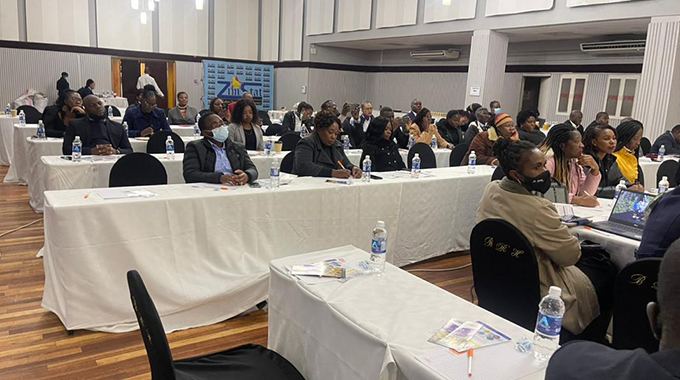Economic census creates jobs for youths
THE rolling out of the first ever Economic Census exercise has created employment opportunities for youths who are expected to play a key role during the data collection process starting next week.
Already, 189 youths from Matabeleland region have been recruited for the first phase of the programme.
The Economic Census is expected to guide national policy formulation and set the tone for the National Development Strategy (NDS2), which will lead the country to the attainment of Vision 2030.
Yesterday, the Zimbabwe National Statistics Agency (Zimstat) started a week-long training of enumerators who will conduct the mapping exercise. The programme will run from next month to the end 2026.
For Matabeleland region, the training is being held at Hillside Teachers College. In other parts of the country the training is being held at Belvedere Teachers College in Harare, Mutare Teachers College, Mkoba Teachers College and Chinhoyi University of Technology.
In an interview on the sidelines of the training, Zimstat production statistics division manager Mr Nelson Mupfugami said while only enumerators for mapping exercise have been recruited, more individuals will be employed as the programme is being implemented.
“This exercise that we are undertaking right now is the training of mappers who will be involved in the actual collection of data for the mapping exercise.
“It will run for a week and the importance of this exercise is that it is going to equip them with skills on how to draw maps for our Economic Census.
“The mappers have been recruited from various parts of the country. Here we have 189 enumerators that are coming from Matabeleland North, Matabeleland South and Bulawayo,” said Mr Mupfugami.
“We expect to expand the numbers of our enumerators, the listing exercise will be quite bigger than the mapping exercise. We will employ more people at each and every stage of the Economic Census.”
He said enumerators under training were expected to do the mapping exercise, which will guide the areas where the census will be conducted. Youths with Mathematics and Geography at Ordinary Level qualified for the training exercise.
“After this training exercise, they are now going to be deployed into business areas where they are going to collect data for mapping exercises. This mapping involves demarcating the country into small geographic areas, which we call business enumeration areas,” he said.
“So, after doing the mapping, we will do the listing where they will visit the mapped business areas and do the listing of all the establishments in those enumeration areas.”
Mr Mupfugami said the Economic Census is important for the country as it will create a statistical business register to be used for planning purposes.
“It’s going to give us baseline information on the size and structure of our country. It will form the basis of all our economic surveys. Once we have the economic census we now have a complete frame of all the establishments and economic activities being undertaken in Zimbabwe, which will inform all the surveys,” said Mr Mupfugami.
Some of the youths that were recruited were coming from remote areas of the country. Ms Samantha Moyo (25) from Brunaperg in Mangwe District, Matabeleland South said the enumeration contract came at an opportune time as she had lost her employment with a non-governmental organisation.
“I used to work for an NGO where I was doing data collection and evaluation but my contract expired. I learnt Geography and Population Studies, so this is going to help me gain skills statistically because I didn’t know some of the practical work.
“Financially, this programme is going to assist me because I have quite a lot of gaps that I want to cover,” said Ms Moyo.
Another youth, Mr Hanniel Timothy (28) from Siansundu, Binga, said he has been doing piece jobs and that being recruited to be an enumerator will assist his family.
“I’m taking care of my children. At the moment I was relying on piece jobs. So, this enumeration exercise is going to assist take care of my children. I was really excited to be called from home to be part of this,” said Mr Timothy.
Ms Happiness Gomwe, a part three student at the National University of Science and Technology studying architecture said being recruited for the exercise will enable her to have field experience, especially on a programme she is studying. She said the money she will get will also enable her to cover some of her needs.
“We are going to be doing mapping for the areas that will be covered by the Economic Census. My studies involves mapping, there is a course that is called Spatial Planning. So, I’m happy that I’m going to be on the ground getting practical lessons,” she said.
“Secondly, it is paying, I’m very happy because I will be able to pay my tuition and cover some of the things that as a student I would want to do.”
ZimStat acting director general, Mr Aluwisio Mukavhi, said the Economic Census exercise will come up with comprehensive baseline statistics on the size and structure of the country’s economy.
“The statistics will enable the Government, private sector, research institutions, academia and other stakeholders to understand the economic landscape of our country, thereby facilitating evidence-based policy formulation, decision-making and strategic planning,” he said.
“The results of this census are key as they will inform the crafting of National Development Strategy 2 (NDS2).” — -ebusinessweekly









